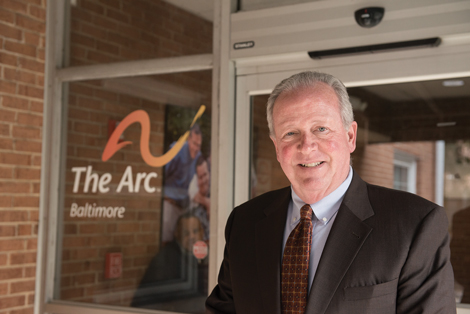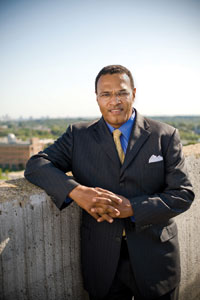Sometimes a person’s journey to become one of the state’s most effective CEOs is surprisingly direct.
Take Stephen Morgan ’72, psychology, who is the executive director of The Arc Baltimore. Morgan began his career at the organization as an undergraduate, teaching at a summer camp for disabled adults.
Fast forward to 2014, and the Maryland Daily Record names him as one of “Maryland’s Most Admired CEOs.” It’s an achievement that Morgan observes is as much about the organization as it is about his leadership.
“The award is flattering,” he says, “but what I like is that it’s for the ‘most admired.’ It’s not just about what we do, but how we do it. It’s really about all of us at The Arc, not just me.”
Headquartered in Towson, The Arc now has 10 state chapters. The organization provides employment training and support, residential services, family support and education, treatment foster care, respite care, public policy advocacy and information and referrals for over 6,000 people with intellectual and developmental disabilities.
Morgan knew early on that he wanted to teach or work in human services. He transferred to UMBC in his sophomore year as a psychology major. As a member of one of UMBC’s first graduating classes, what Morgan remembers is the community atmosphere and direct access to faculty.
Recent visits to a fast-growing campus haven’t changed his view of the UMBC experience “It was a much smaller campus then,” says Morgan, “but even with more people and buildings, UMBC still has that warm, inviting atmosphere, that student-centered feeling.”
Morgan eventually completed all of the coursework for elementary school education as well as his degree in psychology.
“I felt that my academic training would prepare me to enter a variety of fields,” he recalls, “and even now I still come back to what I learned at UMBC – those fundamentals of psychology and education.”
Morgan felt a connection with the adults at the camp where he taught as an undergraduate, and joined The Arc (then known as the Baltimore Association for Retarded Citizens) full time after graduation as a teacher at one of its child development centers.
It was a historical moment – just a few years before the Equal Education Opportunities Act (EEOA) of 1974 was signed into law – when The Arc’s programs were one of the few educational options for disabled children. They could not attend public school, and after age 18 they were often institutionalized. Adults also had few, if any, chances for education or job training.
“The students I taught didn’t learn as easily or in a conventional fashion, but they were still able to learn, just at a different rate and in a different way,” Morgan explains.
Morgan was a program manager overseeing four child development centers for The Arc when the landmark federal legislation passed. He served as a liaison, helping to transition children into public schools. “The children who had been at The Arc had a much easier time acclimating because of the education they received with us,” he says.
Amid rapid increases in opportunity for the community he served, Morgan worked in training, curriculum development, and management positions at The Arc over the next two decades. By the time the Americans with Disabilities Act (ADA) passed in 1990, securing significant job training and employment programs for the disabled, he had been executive director for five years.
“The ADA was more like an omnibus civil rights bill that supported independence and integration,” says Morgan. “It established the rights of individuals to have access to the same public and private resources everyone else does, including access to transportation support, and it asked employers to find ways to adapt their workplaces for disabled workers. These changes helped the disabled become less isolated and more a part of their communities.”
Morgan says that he’s welcomed the opportunity to make the story of The Arc his own story throughout his professional life.
“It’s often considered an anomaly now,” he says, “to stay at the same organization your entire career. But I had the good fortune to have opportunities for advancement and new challenges at The Arc just when I was ready for them.”
– Eleanor Lewis
Tags: spring 2015



